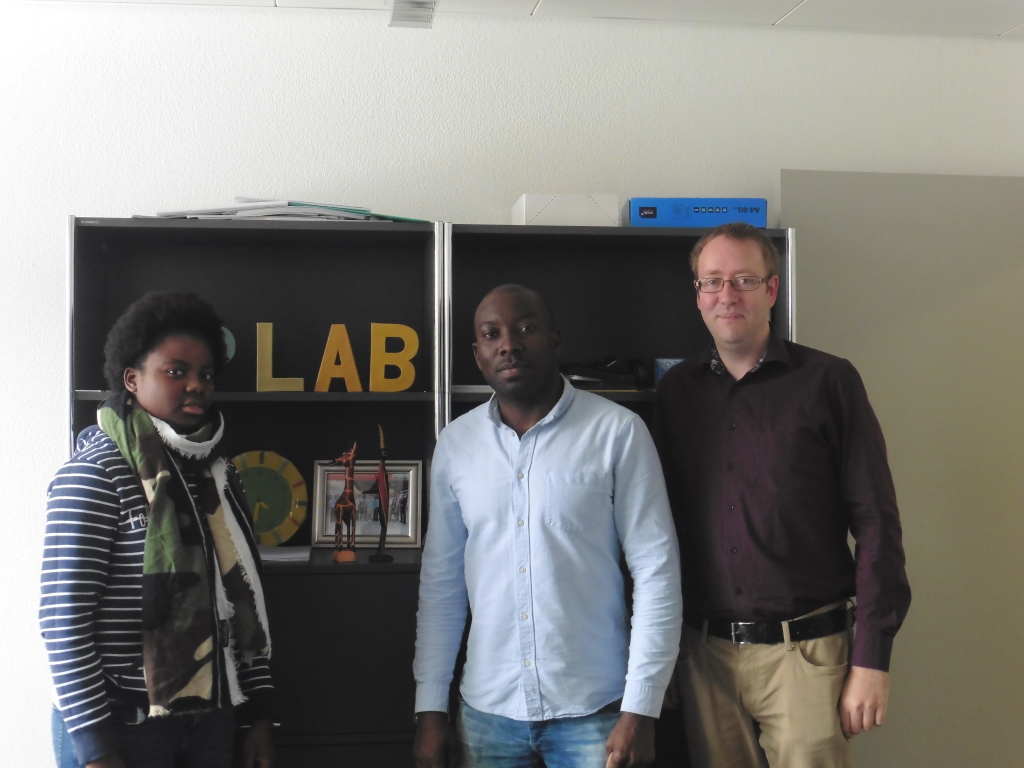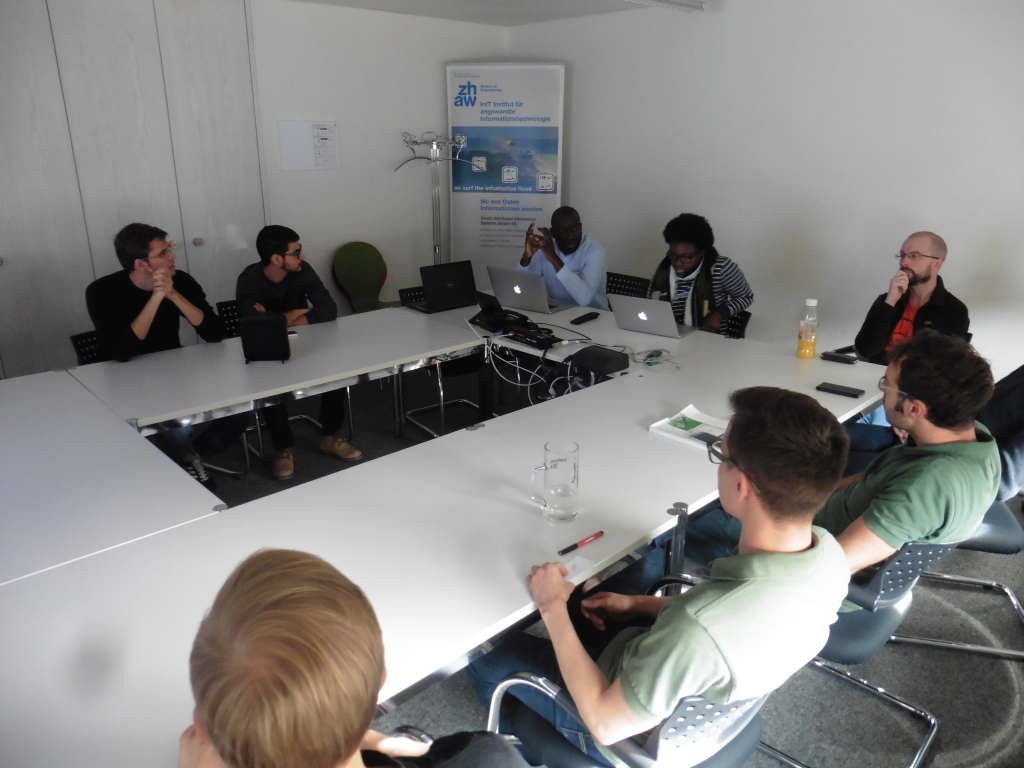In the final days of October, the Service Prototyping Lab at Zurich University of Applied Sciences (ZHAW) hosted two doctoral candidates who take part in the structured doctoral programme Information Technology and Systems at Universidade Eduardo Mondlane (UEM) in Maputo, the capital of Mozambique. The candidates Martina Barros and Ambrósio Vumo arrived from Germany, as they spent a significant part of their research time at Technische Universität Dresden (TUD) as part of the DAAD-funded joint programme Welcome to Africa. The realisation of this programme also involves the Service Prototyping Lab as competence centre for research and innovation on cloud applications and new services for digital economies. This article describes how innovation transfer was conducted during the stay.

Martina’s research encompasses the customised design and development of computer science curricula for universities in Mozambique. Ambrósio’s research topic evolves around strategic guidelines and technical decisions for the introduction of cloud computing in the country. As part of their stay, the two research topics were presented to the local research groups, gathering feedback and ideas for improvements and more specific scientific exploration and validation methods. The summary on initial findings on cloud computing strategy and education levels in various countries led to a vivid debate which continued well into the subsequent lunch break. Effectively, a coherent strategy and government support is needed to break through the impasse of requiring skilled workforce for education, but also for the operation of IT infrastructures and applications offered as secure services within the government and on the intersection with businesses, academics and private users. Technological choices such as freely available cloud platforms are inherently driven by the strategic needs of the workers and citizens of the country. After all, the general interest is to save cost and gain flexibility by securely migrating web, mobile and rich client application backends to the cloud.

During the week of the visit, several appointments were included in the agenda. The appointments within the university included a discussion of ZHAW’s bachelor programme in computer science, as well as attendance of lectures in computer science (monetisation of microservices / 5th semester), business engineering (Python functions / 1st semester), and advanced studies (data analytics with Python).
Beyond the boundaries of the university, the appointments encompassed debates about Zurich cantonal data protection regulations with a visit to the DSB, video conferences with external research partners and students concerning ongoing activities in cloud-native and serverless applications, insights into commercial cloud provider operations at VSHN AG, and evening talks about cloud computing and Internet of Things applications. The remaining time was used to advance the respective dissertations, while little time remained to have a glimpse at touristic points of interest in Winterthur and Zurich.
Martina summarises her stay at the lab as follows:
In October 2017 I had the opportunity to visit the SPLab. On the first day, I had a Winterthur downtown tour and I met the SPLab team. I had the opportunity to know about the research work that has been conducted and also participate in some meetings. I was a little bit surprised but happy to see a multicultural team. I met with Prof. Olaf Stern, head of curricula CS at ZHAW. We had a very productive discussion related to development of a computer science curriculum. I’m a PhD candidate and my research focuses on information security education. I made a small presentation about my research work and received positive feedback and contributions. During my stay I visited one of the Data Protection Authorities (DPAs) in Switzerland the Datenschutzbeauftrager (DSB) Kanton Zurich. It was a very interesting experience because I had the opportunity to discuss with the DSB representatives about data protection and know in deep which mechanisms they have and use to guarantee the protection of personal information. I participated in a meetup related to cloud computing and IoT hosted by DigiComp. It was a really new experience for me but exciting to know more about Clouds and IoT. On the last day, I visited VSHN, Switzerlands leading DevOps, Docker, Kubernetes, Openshift 24/7 cloud operations partner. It was also a very interesting experience and I took the opportunity to make contacts for future collaborations. I want to thank Dr. Spillner for enabling this exchange of experiences and for the warm welcome to Winterthur. I believe that with this trip we started a link for future cooperations and collaborations between SPLab and Eduardo Mondlane University (UEM). Last but not least I want to thank all the SPLab and ICCLab members. They were very friendly. Manolo, thanks for the Zurich tour. Obrigado .
Ambrósio adds his personal perspective:
I am one of the students of project ”Welcome Africa” at the Technical University of Dresden in Germany and I am working in the area of security in cloud computing and one of the activities programmed in this doctoral project consists of an internship in Zürcher Hochschule für Angewandte Wissenschaften (School of Engineering) at Service Prototyping Lab (SPLab). In this context, I had the opportunity to meet with the SPLab and ICCLab team in Winterthur where I have presented my doctoral project and participated in the lectures in Python programing, Service Monetisation and CAS Scripting. It was very good experience working with SPLab team and exchange of experiences in the company such as VSHN that is linked with cloud computing applications and cloud computing deployment platforms, Azure Meetup where I participated in the Data Science Night event where three presentations related to new solutions of the Microsoft Azure such as Machine Learning (ML) and Applied Azure Internet of Things Scenario with Real Time R Analysis and Datenschutzbeauftragter Kanton Zürich (dsb), where Veronica Blattmann and her team have explained how this government institution works to ensure information security for citizens of Zürich and control of websites through network and applications assessment and guarantee security requirements in cyber space are implemented by websites owners. Besides this activities, also I have known the city of Zürich and I have visited the ETH University of Zürich which Albert Einstein has formed and Opernhaus Zurich. I would like to thank SPLab team and especially my supervisor Dr. Josef Spillner for the opportunity and experience in Cloud computing.